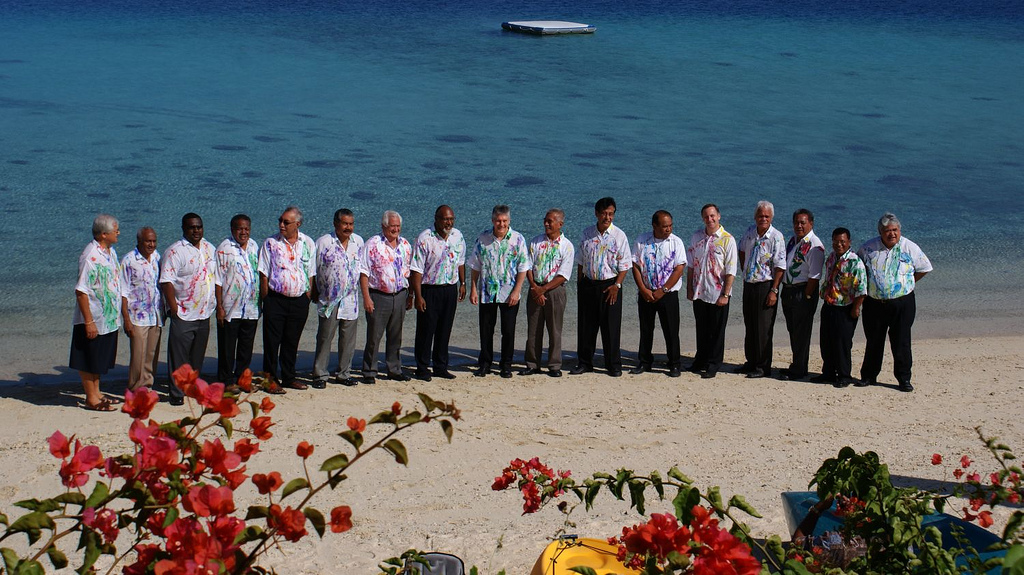Source: The Strategist
The Pacific Island states agreed to shift the secretariat functions on trade negotiations for the Pacific ACP group from the Pacific Islands Forum to Papua New Guinea. The decision weakens both the Pacific Islands Forum and the influence that Canberra has long enjoyed through it. Since early 2009, Australia and New Zealand have used their influence in the Forum to extend Fiji’s exclusion from important regional affairs like the Pacific ACP meetings, manoeuvring to deem Fiji’s suspension from the Forum to include joint activities with the Forum, even where the corresponding body had imposed no such sanctions on Fiji.
We need to be careful to avoid looking like the South Pacific is an afterthought to Australia’s broader strategy. While Canberra continues to talk of the ‘Asian Century’, the Pacific Islanders are certain that it is an ‘Asia–Pacific Century’.
A
special meeting in Port
Moresby on Wednesday has ended Fiji’s exclusion from the deliberations
of the Pacific group of the European Union’s ACP (Asia Caribbean
Pacific) association.
That mightn’t sound like the biggest news story around, but it was front-page news in Suva.
It scarcely rated a mention in Australian newspapers but it was bad
news for Canberra, whatever the government might try to make of our
neighbours’ action.The Pacific Island states agreed to shift the secretariat functions on trade negotiations for the Pacific ACP group from the Pacific Islands Forum to Papua New Guinea. The decision weakens both the Pacific Islands Forum and the influence that Canberra has long enjoyed through it. Since early 2009, Australia and New Zealand have used their influence in the Forum to extend Fiji’s exclusion from important regional affairs like the Pacific ACP meetings, manoeuvring to deem Fiji’s suspension from the Forum to include joint activities with the Forum, even where the corresponding body had imposed no such sanctions on Fiji.
We need to be careful to avoid looking like the South Pacific is an afterthought to Australia’s broader strategy. While Canberra continues to talk of the ‘Asian Century’, the Pacific Islanders are certain that it is an ‘Asia–Pacific Century’.
Our Pacific Island neighbours know that their place in evolving global geo-politics depends on effective relations with Asia. That’s why they’re extending and expanding these relationships while strengthening compatible traditional arrangements. The ACP group has been important for trade and aid relations with all the EU member states’ former dependencies. It has become critical as the EU and the ACP states adjust to changing global economic conditions.
Richard Herr
" Our Pacific Island neighbours know that their place in evolving global geo-politics depends on effective relations with Asia [...]
The Forum does vital work for the region and is much valued for that but it is verging on a crisis of legitimacy. By entangling sanctions and its wider program of work, it has overplayed its hand politically. "
Fijian Interim Prime Minister Frank Bainimarama wasn’t alone in seeing the PNG gesture as working to build up the Melanesian Spearhead Group’s (MSG) influence within the region at the expense of the Forum. This plays to Fiji’s advantage, which is why it has been active in promoting the MSG (which includes neither Australia nor New Zealand) over the Forum. This play was made possible by the ill-advised use of the Forum as a vehicle for sanctions. The MSG member states—Fiji, PNG, Solomon Islands and Vanuatu—comprise the largest and most significantly resource rich part of the Pacific Islands region. It is by far the area of most interest to Asia.
Others have lined up to support this move. Solomons’ Prime Minister Gordon Darcy Lilo described the decision in Port Moresby to establish a Pacific ACP secretariat in Papua New Guinea as a major breakthrough. This is part of a trend. Since the Bainimarama coup in December 2006, various Australian governments have also watched impotently as Australia’s Pacific Island neighbours have moved away from the Forum towards the Pacific Small Island Developing States (PSIDS) group, which has taken on the role of regional leadership at the United Nations. These states, all members of the Forum, have done so on the same grounds as the Pacific ACP leadership. Like the MSG, PSIDS excludes Australia and New Zealand and has been accepted by many UN member states as the more authentic face of the Pacific Islands.
The Forum does vital work for the region and is much valued for that but it is verging on a crisis of legitimacy. By entangling sanctions and its wider program of work, it has overplayed its hand politically. Virtually all the blame of this can be laid at the doorstep of Canberra and Wellington. For example, the failure to readmit Fiji at this year’s Forum Leaders Meeting was a serious error of judgment. Foreign Minister Bob Carr’s view of ‘too soon’ contrasts glaringly with President Obama’s recent remarks in Myanmar. Obama didn’t say that his visit was ‘too soon’, but that it was intended to strengthen the return to democracy in a country that reportedly still has hundreds of political prisoners.
The Pacific ACP decision is a direct consequence of Canberra’s timidity and hesitancy with regard to Fiji. This continues to work against our own regional interests and those of our neighbours, at a serious cost to our place amongst them in the Forum.
Richard Herr is an honorary research associate at the University of Tasmania’s School of Government.
Further Reading:
Club Em Designs


